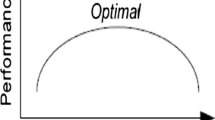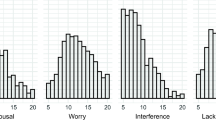Abstract
Differences in academic performance can surely be explained by differences in cognitive aptitudes, but cognitive-affective variables like self-efficacy or anxiety may also intervene. This paper is partly based on Bandura’s social cognitive theory and several assumptions relative to the systemic organisation of the cognitive-affective variables just mentioned with academic performance are tested. 505 students in the 4th and 5th grades were invited to participate in the study. Anxiety and self-efficacy are measured by self-report questionnaires at two levels of generality: dispositional (trait-like variables) and situational (state variables). Performance refers to the scores obtained at an usual French exam. Path analyses replicate the same functional relation between self-efficacy and anxiety. But when one aims at explaining performance, Bandura’s general hypothesis of an effect of self-efficacy on performance directly and indirectly via anxiety doesn’t hold anymore when individual differences in the level of knowledge are taken into account. Interesting enough is the finding of rather different models when the level of knowledge is considered. Indeed, it seems that cognitive affective variables play a more important role to explain performance when the students’ level of French knowledge is low.
Résumé
On peut évidemment expliquer les différences de performance scolaire par des différences d’aptitudes cognitives, mais des variables cognitivo-affectives comme l’auto-efficacité ou l’anxiété peuvent également être évoquées. En se basant en partie sur la théorie sociocognitive de Bandura, on testera plusieurs hypothèses relatives à l’organisation systémique des variables mentionnées ci-dessus avec la performance. 505 élèves de CM1-CM2 ont participé à létude. L’anxiété et l’auto-efficacité sont mesurées par des questionnaires d’auto-évaluation à deux niveaux de généralité: dispositionnel et situationnel. Le niveau de performance réfère ici aux résultats obtenus lors d’un banal examen de français. Dans les différentes analyses de parcours effectuées, on réplique la même relation fonctionnelle entre auto-efficacité et anxiété. Cependant, quand on cherche à expliquer le niveau de performance, l’hypothèse générale de Bandura d’un effet direct et indirect (via l’anxiété) de l’auto-efficacité sur la performance, ne tient plus quand on prend en compte les différences individuelles dans le niveau de connaissances en français des élèves. Un autre résultat intéressant renvoie à la découverte de modèles assez différents en fonction du niveau de connaissance. En effet, les variables cognitivo-affectives semblent jouer un rôle plus important dans l’explication de la performance quand le niveau de connaissance des élèves est faible.
Similar content being viewed by others
References
Alexander, P.A., Kulikowich, J.M., & Jetton, T.L. (1995). Interrelationship of knowledge, interest and recall: Assessing a model of domain learning.Journal of Educational Psychology, 87, 4, 559–575.
Bandalos, D.L., Yates, K., & Thorndike-Christ, T. (1995). Structure model of test anxiety: Effects of math self-concept, perceived self-efficacy and attributions for failure and success on test anxiety.Journal of Educational Psychology, 87, 4, 611–623.
Bandura, A. (1977). Self-efficacy: toward a unifying theory of behavioral change.Psychological Review, 84, 2, 191–215.
Bandura, A. (1986).Social foundations of thought and action: A social cognitive theory. Englewood Cliffs: Prentice Hall.
Bandura, A. (1988). Self-efficacy conception of anxiety.Anxiety Research, 1, 77–98.
Bandura, A. (1991). Self-regulation of motivation through anticipatory and self-reactive mechanisms. In R.A. Dienstbier (Ed.),Perspectives on motivation: Nebraska Symposium on Motivation (vol. 38, pp. 69–164). Lincoln: University of Nebraska Press.
Bandura, A. (1991). Exercise of personal agency through the self-efficacy mechanism. In R. Schwarzer (Ed.),Self-efficacy: Thought control of action (pp. 3–38). Washington, D.C.: Hemisphere.
Bandura, A. (1993). Perceived self-efficacy in cognitive development and functioning.Educational Psychologist, 28, 2, 117–148.
Bandura, A. (1994). Self-efficacy. In V.S. Ramachaudran (Ed.),Encyclopedia of Human Behavior (vol. 4, pp. 71–81). New York: Academic Press.
Bandura, A., Barbaranelli, C., Caprara, G.V., & Pastorelli, C. (1996). Multifaceted impact of self-efficacy beliefs on academic functioning.Child Development, 67, 1206–1222.
Benson, J., & Bandalos, D. (1989). Structural model of statistical test anxiety in adults. In H. van der Ploeg & R. Schwarzer (Eds.),Advances in test anxiety research (vol. 6, pp. 137–154). Hillsdale, NJ: Erlbaum.
Benson, J., Bandalos, D., & Hutchinson, S. (1994). Modeling test anxiety among men and women.Anxiety, Stress and Coping, 7, 131–148.
Boekaerts, M. (1987). Situational-specific judgments of a learning task versus overall measures of motivational orientation. In E. De Corte, H. Lodewijks, R. Parmentier, & P. Span (Eds.),Learning and Instruction (pp. 169–179). Oxford: Leuven University Press & Pergamon Press.
Boekaerts, M. (1991). Subjective competence, appraisals and self-assessment.Learning and Instruction, 1, 1–17.
Boekaerts, M. (1992). The adaptable learning process: Initiating and maintaining behavioural change.Applied Psychology: An International Review, 41, 4, 377–397.
Boekaerts, M. (1997). Capacity, inclination and sensitivity for mathematics.Anxiety, Stress and Coping, 10, 5–33.
Bouffard-Bouchard, T., Parent, S., & Larivée, S. (1991). Influence of self-efficacy on self-regulation among junior and senior high-school age students.International Journal of Behavioral Development, 14, 2, 153–164.
Bouffard, T., Boisvert, J., Vezeau, C., & Larouche, C. (1995). The impact of goal orientation on self-regulation and performance among college students.British Journal of Educational Psychology, 65, 317–329.
Cantor, N. (1981). Perceptions of situations: situation prototypes and person-situation prototypes. In D. Magnusson (Ed.),Toward a psychology of situations: An interactional perspective (pp. 229–244). Hillsdale: NJ: Erlbaum.
Covington, M.V., & Omelich, C.L. (1988). Achievement dynamics: The interaction of motives, cognitions and emotions over time.Anxiety Research, 1, 165–183.
Dickes, P., Tournois, J., Flieller, A., & Kop, J.L. (1994).La psychométrie. Paris: Presses Universitaires de France.
Dweck, C., & Elliot, E.S. (1988). Goals: An approach to motivation and achievement.Journal of Personality and Social Psychology, 54, 5–12.
Endler, N.S., & Parker, J.D.A. (1992). Interactionism revisited: Reflections on the continuing crisis in the personality area.European journal of Personality, 6, 177–198.
Eysenck, M.W. (1992).Anxiety: The cognitive perspective. Hillsdale, NJ: Erlbaum.
Eysenck, M.W., & Calvo, M.G. (1992). Anxiety and performance: The processing efficiency theory.Cognition and Emotion, 6, 409–434.
Feldman, S.C., Martinez-Pons, M., & Shaham, D. (1995). The relationship of self-efficacy, self-regulation, and collaborative verbal behavior with grades: Preliminary findings.Psychological Reports, 77, 971–978.
Garcia, T., & Pintrich, P.R. (1996). The effects of autonomy on motivation and performance in the college classroom.Contemporary Educational Psychology, 21, 477–486.
Hackett, G. (1985). Role of mathematics self-efficacy in the choice of math-related majors of college women and men: A path analysis.Journal of Counseling Psychology, 1, 47–56.
Hackett, G., & Betz, N.E. (1989). An exploration of the mathematics self-efficacy/mathematics performance correspondence.Journal of Conseling Psychology, 1, 47–56.
Jöreskog, K.G., & Sörbom, D. (1993). LISREL 8 User’s Reference Guide. Chicago: Scientific Software.
Larsen, R.J. (1989). A process approach to personality psychology: Utilizing time as a facet of data. In D.M. Buss & N. Cantor (Eds.),Personality psychology: Recent trends and emerging directions (pp. 177–193). New York: Springer-Verlag.
Locke, E.A., Frederick, E., Lee, C., & Bobko, P. (1984). Effect of self-efficacy, goals and task strategies on task performance.Journal of Applied Psychology, 69, 2, 241–251.
Magnusson, D. (1988). A theoretical framework: The interactional perspective. In D. Magnusson (Ed.),Individual development from an interactional perspective (pp. 15–43). Hillsdale, NJ: Erlbaum.
Maruyama, G.M. (1998). Basics of structural equation modeling. Thousand Oaks: Sage Publications.
Meece, J.L., Wigfield, A., & Eccles, J. (1990). Predictors of mathematics anxiety and its influence on young adolescents’ course entrollment intentions and performance in mathematics.Journal of Educational Psychology, 82, 1, 60–70.
Minnaert, A. (1996). Can metacognition compensate for intelligence in the first year of Belgian higher education?Psychologica Belgica, 36, 4, 227–244.
Multon, K.D., Brown, S.D., & Lent, R.W. (1991). Relation of self-efficacy beliefs to academic outcomes: A meta-analytic investigation.Journal of Counseling Psychology, 38, 1, 30–38.
Pajares, F., & Kranzler, J. (1995). Self-efficacy beliefs and general mental ability in mathematical problem-solving.Contemporary Educational Psychology, 20, 426–443.
Pajares, F., & Miller, M.D. (1994). Role of self-efficacy and self-concept beliefs in mathematical problem solving: A path analysis.Journal of Educational Psychology, 86, 2, 193–203.
Pajares, F., & Valiante, G. (1996).Predictive utility and causal influence of the writing self-efficacy beliefs of elementary students. Paper presented at the meeting of the American Educational Research Association, New York.
Pintrich, P.R., Aderman, E.M., & Klobucar, C. (1994). Intraindividual differences in motivation and cognition in students with and without learning disabilities.Journal of Learning Disabilities, 27, 6, 360–370.
Pintrich, P.R., & De Groot, E.V. (1990). Motivational and self-regulated learning components of classroom academic performance.Journal of Educational Psychology, 82, 1, 33–40.
Pintrich, P.R., & Garcia, T. (1993). Intraindividual differences in student’s motivation and self-regulated learning.Zeitschrift für Pädagogische Psychologie, 7, 99–107.
Randhawa, B.S., Beamer, J.E., & Lundberg, I. (1993). Role of mathematics self-efficacy in the structural model of mathematics achievement.Journal of Educational Psychology, 85, 1, 41–48.
Schiefele, U. (1991). Interest, learning and motivation.Educational Psychologist, 26, 299–323.
Schiefele, U., & Csikszentmihalyi, M. (1994). Interest and the quality of experience in classrooms.European Journal of Psychology of Education, 9, 3, 251–270.
Schiefele, U., & Csikszentmihalyi, M. (1995). Motivation and ability as factors in mathematics experience and achievement.Journal for Research in Mathematics Education, 26, 2, 163–181.
Schraw, G., Horn, C., Thorndike-Christ, T., & Bruning, R. (1995). Academic goal orientations and student classroom achievement.Contemporary Educational Psychology, 20, 359–368.
Schunk, D.H. (1984). Self-efficacy perspective on achievement behavior.Educational Psychologist, 19, 1, 48–58.
Schunk, D.H. (1989a). Self-efficacy and achievement behaviors.Educational Psychology Review, 1, 3, 173–208.
Schunk, D.H. (1989b). Self-efficacy and cognitive skill learning.Research on Motivation in Education, 3, 13–44.
Schunk, D.H. (1991). Self-efficacy and academic motivation.Educational Psychologist, 26, 207–231.
Seegers, G., & Boekaerts, M. (1993). Task motivation and mathematics achievement in actual task situations.Learning and Instruction, 3, 133–150.
Seegers, G., & Boekaerts, M. (1996). Gender-related differences in self-referenced cognitions in relation to mathematics.Journal for Research in Mathematics Education, 27, 2, 215–240.
Snow, R.E. (1994). Abilities in academic tasks. In R.J. Sternberg & R.K. Wagner (Eds.),Mind in context (pp. 3–37). Cambridge: Cambridge University Press.
Spielberger, C.D., Gorsuch, R., & Lushene, R. (1970).The State-Trait Anxiety Inventory (STAI): Test manual. Palo Alto, CA: Consulting Psychologists Press.
Thissen, D., & Steinberg, L. (1988). Data analysis using item response theory.Psychological Bulletin, 104, 3, 385–395.
Vanderstoep, S.W., Pintrich, P.R., & Fagerlin, A. (1996). Disciplinary differences in self-regulated learning in college students.Contemporary Educational Psychology, 21, 345–362.
Vezeau, C., Bouffard, T., & Tréteault, F. (1997). Impact du type de buts et du sentiment d’auto-efficacité sur l’autorégulation et la performance dans une tâche cognitive.Journal International de Psychologie, 32, 1, 1–14.
Zimmerman, B.J., & Bandura, A. (1994). Impact of self-regulatory influences on writing course attainment.American Educational Research Journal, 31, 4, 845–862.
Zimmerman, B.J., Bandura, A., & Martinez-Pons, M. (1992). Self-motivation for academic attainment: The role of self-efficacy beliefs and personal goal setting.American Educational Research Journal, 29, 3, 663–676.
Author information
Authors and Affiliations
Rights and permissions
About this article
Cite this article
Rouxel, G. Path analyses of the relations between self-efficacy, anxiety and academic performance. Eur J Psychol Educ 14, 403–421 (1999). https://doi.org/10.1007/BF03173123
Received:
Revised:
Issue Date:
DOI: https://doi.org/10.1007/BF03173123




